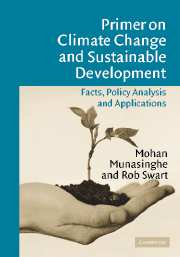Book contents
- Frontmatter
- Contents
- Foreword
- Preface
- 1 Climate change: scientific background and introduction
- 2 Future scenarios of development and climate change
- 3 Framework for making development more sustainable (MDMS): concepts and analytical tools
- 4 Interactions between climate and development
- 5 Adaptation to climate change: concepts, and linkages with sustainable development
- 6 Vulnerability, impacts, and adaptation by sectors and systems
- 7 Vulnerability, impacts, and adapation by geographic region
- 8 Mitigating climate change: concepts and linkages with sustainable development
- 9 Mitigation measures: technologies, practices, barriers, and policy instruments
- 10 Assessment of mitigation costs and benefits
- 11 Climate change and sustainable development: a synthesis
- Index
- References
9 - Mitigation measures: technologies, practices, barriers, and policy instruments
Published online by Cambridge University Press: 25 December 2009
- Frontmatter
- Contents
- Foreword
- Preface
- 1 Climate change: scientific background and introduction
- 2 Future scenarios of development and climate change
- 3 Framework for making development more sustainable (MDMS): concepts and analytical tools
- 4 Interactions between climate and development
- 5 Adaptation to climate change: concepts, and linkages with sustainable development
- 6 Vulnerability, impacts, and adaptation by sectors and systems
- 7 Vulnerability, impacts, and adapation by geographic region
- 8 Mitigating climate change: concepts and linkages with sustainable development
- 9 Mitigation measures: technologies, practices, barriers, and policy instruments
- 10 Assessment of mitigation costs and benefits
- 11 Climate change and sustainable development: a synthesis
- Index
- References
Summary
Scope for greenhouse gas emissions reduction technologies
Introduction
In Chapter 8, we outlined concepts and methods relating to climate change mitigation. One approach to climate mitigation, as adopted by the Intergovernmental Panel on Climate Change (IPCC) (Anderson et al. 2001; Bashmakov et al. 2001; Kauppi et al. 2001; Moomaw et al. 2001; Sathaye et al. 2001), is followed in this chapter. Currently, many technologies exist that can help in mitigating greenhouse gas emissions (see Section 9.1.2), but there are barriers that prevent them from being implemented fully (see Section 9.1.3). There are also opportunities to implement such technologies, and where barriers exist, they may be removed by generic or targeted policies, measures and instruments (Jepma & Munasinghe 1998).
Buildings and settlements
The building sector contributes almost one - third to global energy-related carbon dioxide emissions. This section describes the many options for the reduction of greenhouse gas emissions from buildings and settlements. They include options to increase the energy efficiency of appliances, equipment, and building structures. Because of population and income growth, as well as other social changes such as decrease of household size in industrialized countries, energy use related to buildings and the associated emissions is growing rapidly. Energy demand in this sector after 1990 has grown by about 2.5 per cent per year, notwithstanding efficiency increases for equipment and appliances. At the same time, the buildings sector offers some of the most cost-effective opportunities for reductions of greenhouse gases, using currently available technologies and practices.
- Type
- Chapter
- Information
- Primer on Climate Change and Sustainable DevelopmentFacts, Policy Analysis, and Applications, pp. 304 - 380Publisher: Cambridge University PressPrint publication year: 2005



